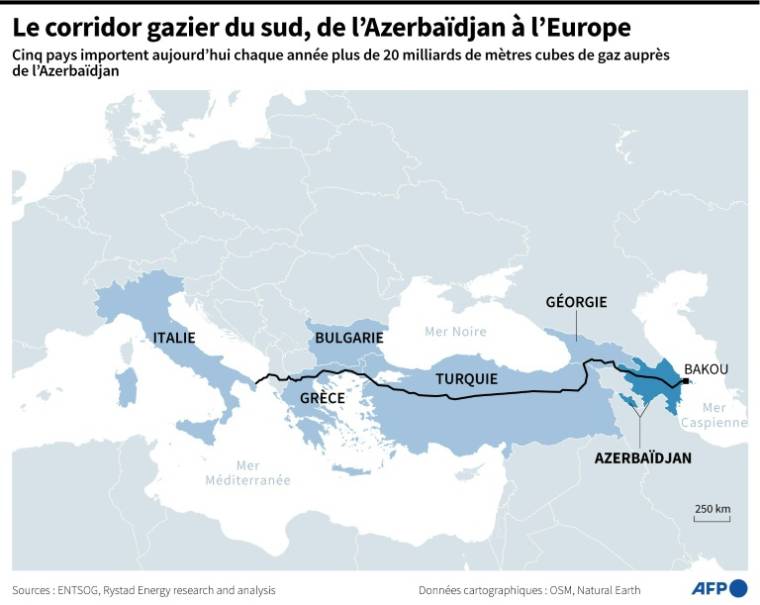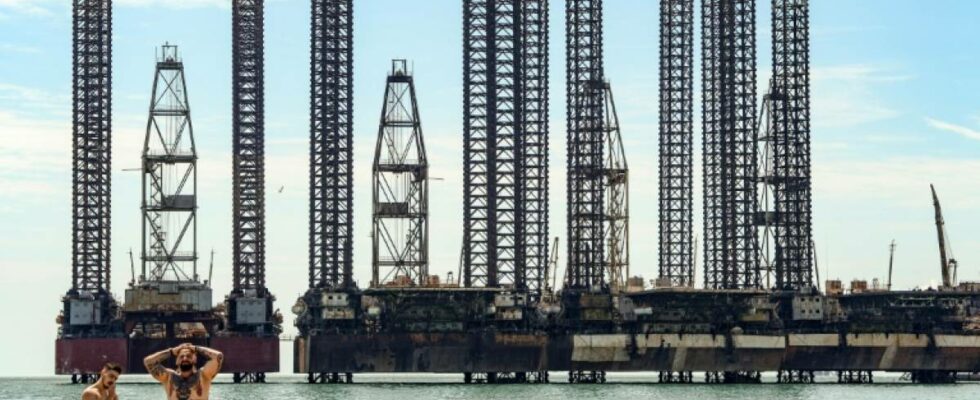A beach on the edge of the Caspian Sea, in front of oil platforms, on August 5, 2020 in Baku, Azerbaijan (AFP / TOFIK BABAYEV)
After COP28 in Dubai, direction Baku: the next climate conference, COP29, will take place in a historic cradle of oil, Azerbaijan, now engaged in a race for gas.
The former Soviet republic of 10 million inhabitants doped with hydrocarbons plans to increase its gas production by 35% in the next ten years, going against the efforts required to contain global warming.
While the last COP in the United Arab Emirates ended with an unprecedented call to “transition” away from fossil fuels, an analysis by the NGO Global Witness based on data from Rystad Energy shows that the host country of COP29 plans to increase its gas production from 35 billion m3 (bcm) in 2024 to 47 bcm in 2034.
The forecast covers the country’s current production figures, production estimates from reserves approved for development as well as reserves confirmed but not yet authorized for exploitation. They exclude condensate, a liquid form of gas.
“Azerbaijan is increasing its gas production at a time when the world urgently needs to shed its fossil fuel habits,” Patrick Galey, head of investigations at Global Witness, told AFP.
The country, a member of OPEC+, has a long history with hydrocarbons, which still fuel half of its economy. In the 13th century, the traveler Marco Polo already described black gold springing from the ground. But today, gas is poised to surpass oil, whose fields are declining.
In the 2030s, gas should represent more than half of the country’s fossil production, according to data communicated by Rystad Energy to AFP.
Its exports to Turkey, Europe, Georgia and Iran have already increased more than threefold since 2015.
Baku’s gas expansion is mainly fueled by the Shah Deniz project, one of the largest gas fields in the world, discovered in 1999 in the Caspian Sea and operated by BP, while other projects such as Umid-Babek and Absheron will rise. in power.
Entering production in July, the Absheron field is operated by Jocap, which brings together Socar, the national oil company of the country from which the president of COP29, the French TotalEnergies, comes, and Adnoc, the Emirati national company which has so much talked about at the last COP.
– Europe is counting on Baku –
The United Arab Emirates, hosts of COP28, had appointed Sultan Al Jaber, boss of Adnoc, to chair the UN conference, a choice which had irritated NGOs and certain countries. In 2024, a similar scenario in Baku: the COP will be chaired by a former Socar executive, Mukhtar Babayev, Minister of Ecology and Natural Resources.

Map showing Azerbaijan and the Southern European gas corridor through which the country exports its production to Turkey, Italy, Georgia, Greece and Bulgaria (AFP / Valentina BRESCHI)
The country is certainly a “small player” in the shadow of the American, Russian or Saudi giants, but it will play a more important role “at least for Southern Europe”, estimates Swapnil Babele, analyst at Rystad Energy.
To replace Russian gas, Europe turned to Azerbaijani gas, the share of which in its imports increased from 2% in 2021 to 4% in 2023, according to Eurostat.
After the offensive in Nagorno-Karabakh, these supplies were criticized in particular by MEPs, who regretted the timid reaction of the EU towards Azerbaijan and called for the interruption of negotiations on the gas agreement signed in 2022. The objective of this agreement is ambitious: to double gas exports to 20 billion m3 by 2027.
The country’s export potential is significant, “but the problem lies in the capacity of its oil pipelines”, emphasizes Swapnil Babele.
Baku exports its gas through the South European gas corridor, a set of gas pipelines which lead to Europe via Georgia and Turkey, notably with the Trans Adriatic Pipeline (TAP) whose capacity can be doubled but at heavy cost. investments. This will involve “long-term commitments” from European gas operators, according to Rystad.
